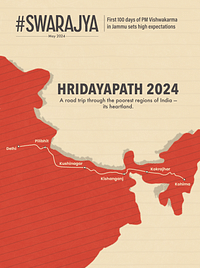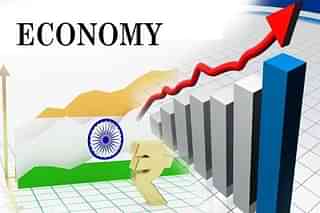Books
The Human Need For Belief Systems: Is 'Wokeism' A Religion In Disguise In Modern Times?
Kushal Mehra
May 11, 2024, 02:23 PM | Updated 02:22 PM IST
Save & read from anywhere!
Bookmark stories for easy access on any device or the Swarajya app.

Nastik: Why I Am Not an Atheist. Kushal Mehra. BluOne Ink. Pages 318. Rs 400.
Religion, ‘Wokeism’, And Secular Societies
The rise of ‘wokeism’ in the West can reflect the inevitability of religion, or at least religion-like phenomena. Despite the secularisation of many Western societies, the human need for meaning, purpose, moral guidance, and community has remained.
‘Wokeism’, emphasising social justice, equality, and awareness of privilege, can be seen as a response to these unmet needs. It provides a secular framework for understanding the world, a moral code, and a sense of community, much like traditional religions.
The parallels between ‘wokeism’ and religion hint at the inevitable nature of religious phenomena. Even without traditional religious belief, new belief systems and ideologies emerge to fulfil the same psychological, sociological, and cultural functions. This suggests that religion, or at least religion-like phenomena, is inevitable in human society.
In conclusion, the ubiquity of religion across cultures and throughout history suggests its inevitability. The psychological, sociological, and cultural functions of religion are fundamental aspects of human society. The rise of ‘wokeism’ in the West, despite its secular nature, echoes many elements of traditional religion, further illustrating the seemingly inevitable nature of religious phenomena.
Creating a Healthy Balance
Creating a balanced society where the excesses of traditional religion and the so-called ‘wokeness epidemic’ are avoided is a significant challenge, but not impossible. The goal should be a society that values open dialogue, respects differing viewpoints, and encourages critical thinking.
The foundation for a balanced society is education. Education should not just be about imparting knowledge but also equipping individuals with the tools to evaluate information and form their opinions critically. This is particularly important in a world increasingly driven by ideology.
A good education should expose students to various perspectives, including different religious and philosophical views and differing perspectives on social issues. This exposure can help students understand that there are multiple ways to interpret the world and that no one ideology has all the answers.
Promoting critical thinking also involves teaching students to question authority and recognise the difference between fact and opinion. This can help individuals resist the allure of dogmatic belief systems, whether they are religious doctrines or ‘woke’ ideologies.
Another critical component of a balanced society is empathy. Empathy encourages us to understand and appreciate the experiences and perspectives of others, even if they differ from our own. It is the antidote to dogmatism and intolerance.
Empathy can be fostered through diverse interactions and exposure to different cultures and belief systems. This can help to break down the ‘us versus them’ mentality that often characterises both religious and ‘woke’ extremism.
It’s also crucial to recognise that empathy must extend to those we disagree with. Disagreement does not necessitate disdain. It is possible, and indeed necessary, to maintain respect and understanding even in the face of ideological differences.
Healthy societies encourage open dialogue and the free exchange of ideas. This can involve creating physical and virtual spaces where individuals can engage in respectful debate and discussion.
Open dialogue allows for changing one’s mind, a quality often lacking in dogmatic belief systems. It also promotes a deeper understanding of complex issues, rarely as black and white as ideological narratives suggest.
To promote open dialogue, pushing back against cancel culture is essential, which stifles free speech and discourages individuals from voicing dissenting opinions. This does not mean tolerating hate speech or bigotry but rather fostering a culture where disagreement is seen as a natural and necessary part of societal discourse.
Balancing the excesses of both traditional religion and ‘wokeness’ is no easy task. However, through education that promotes critical thinking, fosters empathy, and encourages open dialogue, it is possible to create a society that respects diversity of thought and avoids the pitfalls of dogmatism.
In such a society, religion and ‘wokeness’ can exist not as rigid ideologies but as malleable belief systems, open to question and capable of evolving. This requires a shift in how we view disagreement, not as a threat but as an opportunity for growth and understanding.
Save & read from anywhere!
Bookmark stories for easy access on any device or the Swarajya app.
Kushal Mehra is an author and host of 'The Charvaka Podcast'.
Support Swarajya's 50 Ground Reports Project & Sponsor A Story
Every general election Swarajya does a 50 ground reports project.
Aimed only at serious readers and those who appreciate the nuances of political undercurrents, the project provides a sense of India's electoral landscape. As you know, these reports are produced after considerable investment of travel, time and effort on the ground.
This time too we've kicked off the project in style and have covered over 30 constituencies already. If you're someone who appreciates such work and have enjoyed our coverage please consider sponsoring a ground report for just Rs 2999 to Rs 19,999 - it goes a long way in helping us produce more quality reportage.
You can also back this project by becoming a subscriber for as little as Rs 999 - so do click on this links and choose a plan that suits you and back us.
Click below to contribute.





